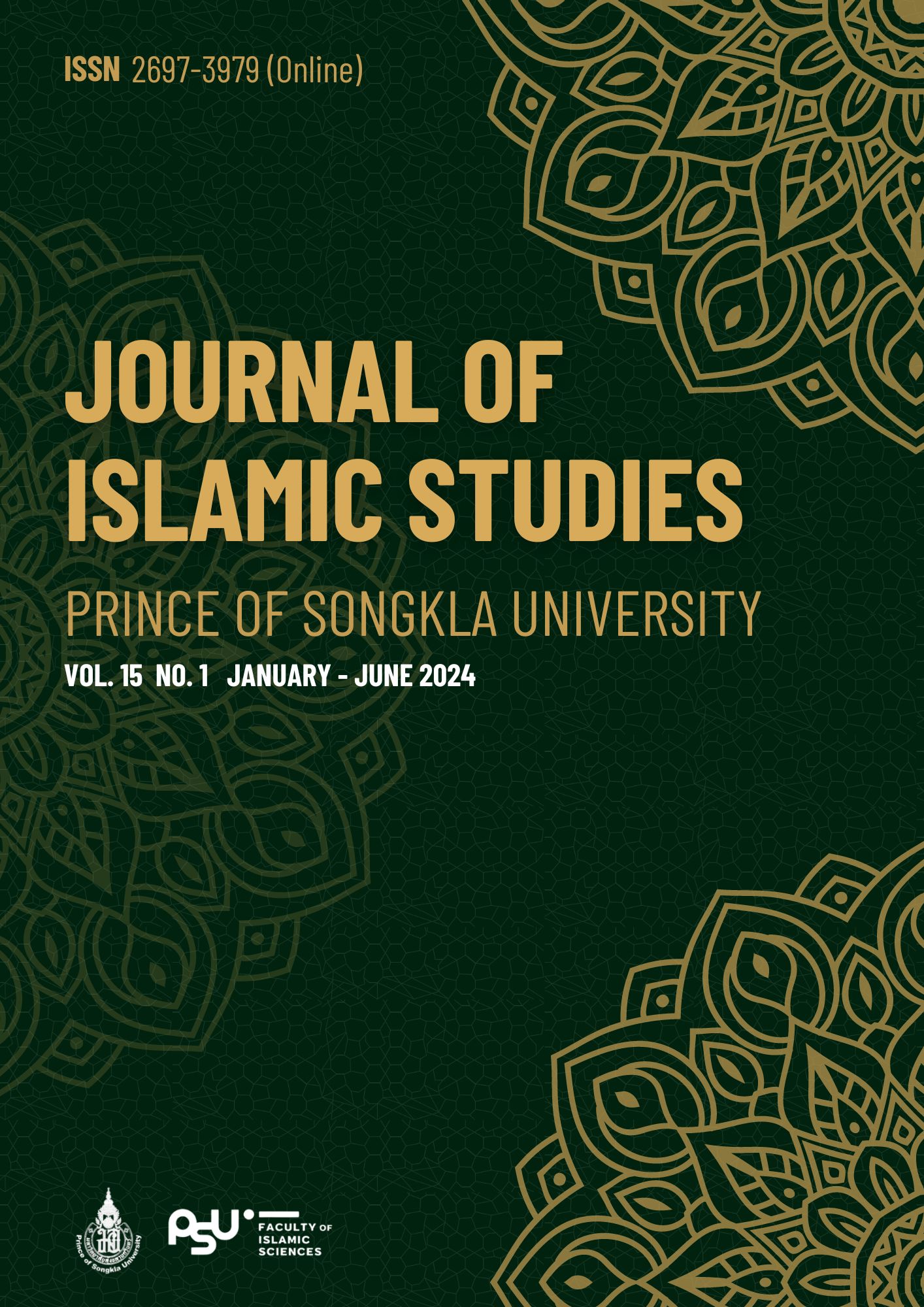Model for Creating a Peaceful Society of Fatoni University Using a Mosque as a Base in Pattani Province
DOI:
https://doi.org/10.14456/jois.2024.7Keywords:
Social, Peace, Fatoni, PattaniAbstract
Objectives: This research is qualitative. The Objective is to study the model for building a peaceful society at Fatoni University using a mosque as a base in Pattani Province.
Methodology: Data was collected through in-depth interviews with key informants, including Imams, Islamic committees at mosques, laypeople, and local scholars. Youth and representatives of government and private agencies, 10 communities, 20 people each, totaling 200 people, selected according to specified criteria from the area of Pattani province. Data was analyzed using a content analysis method. It is based on an in-depth interview framework and group interviews to answer the research objectives
Research findings: Model for creating a peaceful society at Fatoni University using a mosque as a base. Fatoni University, together with ten mosques in Pattani province, has developed the “Peace Model” consisting of 1) P = Pillar, meaning adherence to doctrine, and 2) E = Education, meaning adherence to the principles of the educational process. Learn 3) A = Anasyid means adhering to the principles of transmitting through songs of peace (Anasyid) 4) C = Curriculum means adhering to the principles of curriculum development to create community innovators 5) E = Empowerment means adhering to Principles of manpower potential to lead to the creation of a peaceful society and create community innovators. Based on working in a tripartite manner, namely the community, state, and private sector, the mosque is the base.
Contributions: 1) Office of the Provincial Islamic Committee, Imam Khateb Bilal, and the Mosque Islamic Committee related to the management of the mosque. The results of this research can be used as a guideline for adjusting the model for creating a peaceful society using mosques as a base in Pattani Province. 2) Mosques in Pattani Province should learn about the existing potential of the community in creating a peace model, or the Peace Model to set the direction for development for the community to proceed as the community desires and create awareness and interest in learning in creating peace.
References
Bunga, Y. (2014). Role of Fatoni University in Establishing Peace in the Three Southern Border Provinces[Unpublished master’s thesis]. Prince of Songkla University.
Daoh, R. (2009). Anasyid the Voice of Peace(Research report). Princess Galyani Vadhana Institute of Cultural Studies, Prince of Songkla University Pattani Campus.
Galtung, J. (1996). Peace by peaceful means: Peace and conflict, development and civilization. International Peace Research Institute Oslo; Sage Publications, Inc.
Khamdi, D. (1998). Sasanasad. Kasetsart University.
Kriesberg, L. (2007). Constructive conflicts: From escalation to resolution. Rowman & Littlefield.
Lederach, J. P. (1997). Building Peace: Sustainable Reconciliation in Divided Societies. United States Institute of Peace Press.
Mandech, C., & Putsukee, T., & Thongfhua, S., & Langputeh, S. (2019). Model of Masjids in Mobilization of Taqwa Communities. Journal of Yala Rajabhat University, 14(2), 222-231.
Osman,T., & Kamuning, M., & Cheni, Y. (2013). Peace Building Society Model in the Three Southern Border Provinces of Thailand through Mosque Council Member Process(Research report). supported by Yala Rajabhat University.
Saleah, A., & Sidae, W., & Hanakamae, R., & Daemohleng, D. (2011). Model of learning and innovation in quality of life in Multicultural society using Masjid as a base in Pattani Province. Journal of Islamic Studies, Prince of Songkla University, 12(2), 32-33. https://so03.tci-thaijo.org/index.php/JOIS/article/view/254626/171069
Srivithaya, S. (2015). The Rule of Law and the Reconciliation by Buddhist Ways in Thai Society. Journal of MCU Peace Studies, 3(2), 20-29.
Yerot, M., & Kasor, M. (2022). Fatoni University's Awareness-raising Approach to Dawah to Create a Peaceful Society. Al-Hikmah Journal Fatoni University, 12(24), 403. https://so01.tci-thaijo.org/index.php/HIKMAH/article/view/254753/173427
Downloads
Published
How to Cite
Issue
Section
License
Copyright (c) 2024 © The Author(s). Published by the Journal of Islamic Studies, Prince of Songkla University under the Creative Commons Attribution 4.0 International License.

This work is licensed under a Creative Commons Attribution 4.0 International License.
All articles Published in The Journal of Islamic Studies are author’s opinions, and not the responsibility of the Faculty of Islamic Sciences nor the editorial board. However any citation should be referred to the journal.




















